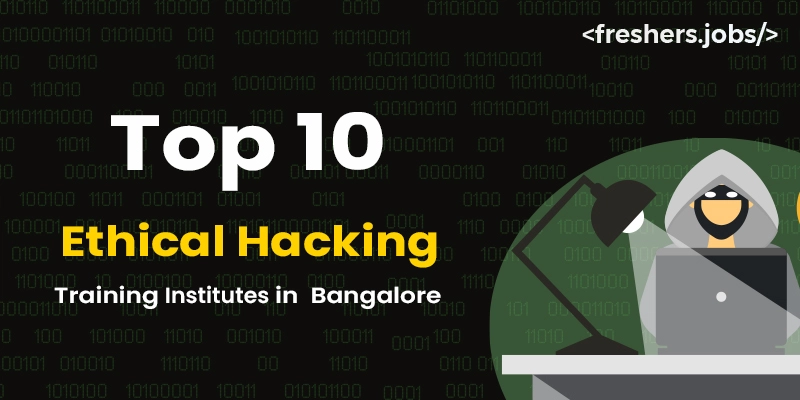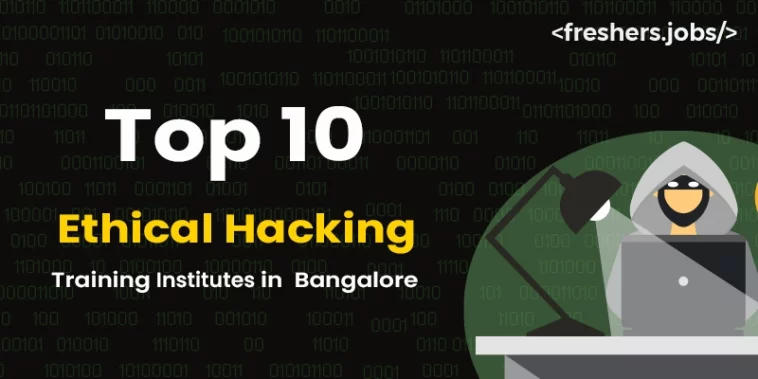Ethical Hacking involves scanning computer networks, systems, and applications for security flaws. Technological advancements and the rapidly growing use of digital platforms have caused significant changes in the corporate landscape. Although these advancements have brought about a lot of opportunities, they have also made firms vulnerable to cybersecurity risks.

Growing awareness of cybersecurity’s critical role in today’s business climate, compliance with regulations, the financial consequences of security breaches, and the increasing frequency of cyber threats are all driving this need. We will delve into the Top 10 Ethical Hacking Training Institute in Bangalore.
These are the top 10 Ethical Hacking Training Institute in Bangalore.
- FITA Academy
- Edureka
- Simplilearn
- Intellipaat
- Besant Technologies
- Apponix Technologies
- Inventateq
- 360DigiTMG
- Skillogic
- Texial
FITA Academy
An extensive selection of more than 120 online and offline courses is available from the respected training organization FITA Academy. The academy is well-known for offering crucial professional and technical certificates, and it has a strong track record in the field. With more than 1,000 trainers on staff who have decades of combined experience, the institute has improved the educational paths of more than 75,000 people. In order to further demonstrate its dedication to providing top-notch instruction, the academy opened branches in Bangalore, Chennai, Pondicherry, Coimbatore, and Madurai. This calculated growth makes sure that people in different areas can take advantage of excellent training possibilities.
Why choose the Ethical Hacking Course in Bangalore at FITA Academy?
There are several benefits to choosing FITA Academy’s Ethical Hacking Course in Bangalore. The institute offers a thorough course on ethical hacking that covers both fundamental and advanced ideas. With the use of real-world examples, the curriculum examines a variety of security procedures, such as network scanning, cryptography, vulnerability identification, penetration testing, and real-time projects. This course gives students the essential cybersecurity skills they need to become skilled hackers. Students learn how to use hacking tools including Burp Suite, N-map, and Nessus through practical instruction. The curriculum, developed by skilled instructors, guarantees the best possible learning results and provides students with up-to-date materials and hands-on instruction for a comprehensive educational experience. Additionally, by offering batch schedules on both weekends and weekdays, the academy guarantees flexibility. After finishing the program, successful participants also receive assistance with placement.
Customized Curriculum of Hacking Course in Bangalore
The Ethical Hacking Course in Bangalore features a tailored curriculum covering fundamental concepts. These include Ethical Hacking, FootPrinting, Enumeration, Network Scanning, System Hacking Methodology and Virtual Machine.
Students will delve into various tools such as Kali Linux, and Metasploit, N-map, and Burp-Suite. You will learn about Sniffing, Malware Threats, Virus & Worms, Denial of Services (DoS) & Distributed Denial of Services (DDoS), Session Hijacking Techniques, Server Attacks, Hacking Web Applications, SQL Injection Attacks, Wireless Networks Attacks, IDS, IPS, Firewalls, and Honeypots, Cloud Computing Techniques, Cryptography, and Social Engineering.
The curriculum also covers topics like Ethical Hacking Experts, Building and Setting Up the Laboratory, Google HDB, OSINT (Open Source Intelligent), Social Engineering Techniques, Scanning and Enumeration Using Advanced Tools, Other Tools, Exploitation, Metasploit Framework for Penetration Testing, Password Cracking, Post Exploitation, OWASP Top 10 Vulnerability, Information Security Audit, and Audit Reporting.
Expert Instructors for the Ethical Hacking Course in Bangalore
The FITA Academy’s Ethical Hacking Course in Bangalore is led by knowledgeable educators with a wealth of practical industry expertise. These committed instructors ensure that students receive thorough preparation in this constantly changing sector by providing both academic knowledge and insightful real-world information about current market trends.
Project Presentation Sessions in Hacking Course in Bangalore
Project presentation sessions are an essential part of FITA Academy’s Hacking Course in Bangalore. These workshops enable students to apply the knowledge and ideas they have learned in real-world circumstances, giving them invaluable hands-on experience. The instructors recognize the significance of practical experience in mastering Ethical Hacking and preparing for a successful career.
Complimentary Placement Sessions in Hacking Class in Bangalore
FITA Academy is dedicated to providing a thorough Hacking Class in Bangalore that goes beyond typical classroom instruction, and as such, it offers free placement sessions. By covering important topics including résumé construction, interview skill improvement, help finding a job, and career counseling, these carefully selected workshops hope to aid students in reaching their career goals. FITA Academy offers graduates a wide range of job placement prospects within the sector through its extensive network of more than 1,500 partner companies. Students are able to access promising career prospects through this extensive network, which facilitates a smooth and successful transition into the workforce.
Edureka
Edureka is renowned for its flexible Ethical Hacking Course, covering basic to advanced topics. While the institute offers a variety of courses, its strong emphasis on online learning may limit direct student-instructor engagement, potentially leading to higher costs.
Simplilearn
Simplilearn specializes in Ethical Hacking Classes for both beginners and advanced learners, featuring an enriched curriculum. However, the predominant focus on online classes may reduce direct interaction between instructors and students, and the course cost could be relatively higher.
Intellipaat
Intellipaat excels in providing ethical hacking courses to enhance skills and industry knowledge. But, the emphasis on online courses may limit face-to-face connections between students and instructors, potentially deterring those seeking a more in-depth educational experience.
Besant Technologies
Besant Technologies offers comprehensive Ethical Hacking Classes with real-time assistance. But, it may not be the top choice for those seeking a more profound learning experience.
Apponix Technologies
Apponix Technologies tailors ethical hacking courses to industry demands. But, they might not provide as extensive placement assistance as some other institutions.
Inventateq
Inventateq provides a comprehensive Ethical Hacking Course, imparting necessary skills. But, they may not offer the depth found in other institutions.
360DigiTMG
360DigiTMG offers customized Ethical Hacking Classes. But, they may not provide as thorough hands-on training as certain other institutions.
Skillogic
Skillogic specializes in delivering comprehensive Ethical Hacking Classes. But, the level of placement support might be relatively less extensive than some other institutes.
Texial
Texial focuses on imparting essential skills through its Ethical Hacking courses. But, their practical training is potentially not as extensive as some other institutes.
Freshers Jobs meticulously selected these institutes after thorough research, considering factors such as brand reputation, student feedback, and a proven track record of student achievements.
Role of Ethical Hacking in the Current Business Era
Ethical hacking is essential to maintain cybersecurity and protect digital assets. It safeguards private financial information in the banking sector and patient records in the medical sector. Ethical hacking strengthens national security systems in government. It is essential to e-commerce since it guards against data breaches and guarantees safe transactions. Ethical hacking is essential for finding weaknesses and fortifying networks in the IT sector.
It protects research data and student information in the field of education. By protecting intellectual property, ethical hacking helps the media and entertainment industries. It guarantees safe channels of communication in telecommunications. The various applications of ethical hacking highlight how crucial it is to preserve the confidentiality and integrity of data in a wide range of industries.
What is Ethical Hacking?
Ethical Hacking, penetration testing or white-hat hacking is a legal and authorized practice involving examining computer systems, networks, and applications to identify security vulnerabilities. Ethical Hacking’s primary goal is to assess a system’s security with the owner or other stakeholders’ express consent. Ethical hackers, frequently employed by organizations or engaged as independent consultants, employ their skills to replicate the tactics of malicious hackers.
However, in contrast to malicious hackers, ethical hackers focus on discovering and addressing vulnerabilities rather than exploiting them for malicious purposes. Ethical Hacking is a vital element of an organization’s cybersecurity strategy, allowing for proactively identifying and resolving security weaknesses. This reduces the possibility of financial losses, reputational harm, and data breaches. Certified ethical hackers often possess industry-recognized certifications, such as Certified Ethical Hacker (CEH), to showcase their expertise and commitment to Ethical Hacking principles.
Advantages of Ethical Hacking
- Vulnerability Identification: Ethical Hacking assists organizations in identifying and rectifying vulnerabilities within their networks, systems, and applications. Proactively seeking weaknesses allows organizations to reinforce security measures before malicious hackers exploit them.
- Improved Security Posture: Regular Ethical Hacking assessments enable organizations to maintain an enhanced security posture. Swiftly addressing vulnerabilities minimizes the risk of security breaches, safeguarding sensitive data and preserving the integrity of systems.
- Risk Mitigation: Organizations are better equipped to evaluate and reduce the risks related to possible cyberthreats thanks to Ethical Hacking. Understanding and addressing vulnerabilities helps reduce the likelihood of financial losses, operational disruptions, and reputational damage from security incidents.
- Compliance with Regulations: Strict cybersecurity requirements bind many sectors and industries. Ethical Hacking aids organizations in ensuring compliance by identifying and rectifying security gaps that may violate legal requirements.
- Prevention of Data Breaches: Ethical Hacking is critical in preventing data breaches by identifying and resolving vulnerabilities before malicious actors can exploit them. This proactive approach protects sensitive information and upholds the privacy of individuals associated with the organization.
- Cybersecurity Awareness: Ethical Hacking fosters cybersecurity awareness within organizations. Organizations can educate employees and management about potential risks through simulated cyber-attacks, fostering a culture of vigilance and responsibility concerning cybersecurity.
- Incident Response Preparedness: Ethical Hacking assessments contribute to incident response preparedness. By simulating cyber attacks, organizations can evaluate the effectiveness of their response mechanisms, identify areas for improvement, and ensure a swift and coordinated reaction in the event of a real security incident.
- Building Trust with Stakeholders: Demonstrating a commitment to cybersecurity through Ethical Hacking practices helps build trust with customers, partners, and stakeholders. Organizations investing in securing their systems and data will likely maintain a positive reputation and strengthen relationships with their clientele.
- Competitive Advantage: Organizations prioritizing Ethical Hacking as part of their cybersecurity strategy gain a competitive advantage. Demonstrating a proactive approach to security enhances an organization’s credibility and attractiveness to clients and partners who prioritize data protection.
- Professional Development: Ethical Hacking offers opportunities for individuals to develop and enhance their cybersecurity skills. Certified ethical hackers often undergo specialized training and certifications, contributing to their professional growth and making them valuable assets in the cybersecurity landscape.
Critical Aspects of Ethical Hacking
- Permission: Ethical hacking is conducted with explicit authorization from the organization or system owner. This ensures legality, aligning with ethical standards.
- Scope Definition: Clear delineation of the systems, networks, or applications to be tested is essential. Defining the scope helps focus efforts on critical areas and prevents unintentional disruption.
- Reconnaissance: Ethical hackers collect information about the target system, identifying potential entry points and vulnerabilities. This phase often involves passive techniques to avoid raising suspicion.
- Scanning: Active scanning involves using tools to detect live hosts, open ports, and services. This step aims to uncover potential weaknesses and provides a foundation for further analysis.
- Gaining Access: Ethical hackers attempt to exploit vulnerabilities identified during scanning. This phase mimics the actions of malicious hackers but is conducted within the authorized scope to strengthen security.
- Maintaining Access: Once access is gained, ethical hackers assess the ability to control the system. This step helps identify weaknesses in monitoring and response mechanisms.
- Analysis and Reporting: Ethical hackers analyze the findings, documenting vulnerabilities, successful exploits, and potential impact. A detailed report is then provided to the organization, guiding remediation efforts.
- Post-Testing Activities: This involves collaborating with the organization to implement recommended security measures, addressing vulnerabilities, and ensuring a resilient cybersecurity posture.
- Continuous Monitoring: Ethical hacking is an ongoing process that helps organizations stay on track of emerging threats. Regular assessments ensure sustained security effectiveness.
- Ethics and Professionalism: Ethical hackers adhere to a strict code of ethics, maintaining confidentiality, integrity, and professionalism throughout the testing process. This ensures a responsible and trustworthy approach to cybersecurity.
Job Opportunities in Ethical Hacking
- Security Analyst/Junior Ethical Hacker: Entry-level professionals typically begin as security analysts or junior ethical hackers, supporting more experienced team members and assisting in vulnerability assessments and security testing.
- Security Consultant (Trainee): Trainee security consultants work under the guidance of senior consultants, gaining hands-on experience in Ethical Hacking tasks like penetration testing, vulnerability analysis, and report generation.
- Ethical Hacker/Security Consultant: Professionals at this level conduct thorough security assessments, penetration testing, and vulnerability analyses. They may specialize in specific areas such as web application or network security.
- Security Engineer: Security engineers design and implement security measures for systems and networks, working on tasks like security architecture, firewall configuration, and developing strategies to protect against cyber threats.
- Incident Responder: Professionals in incident response roles investigate and respond to security incidents, identifying root causes of breaches and implementing measures to prevent future incidents.
- Security Researcher: Security researchers explore new vulnerabilities, analyze emerging threats, and contribute to developing security tools and solutions, often working for security companies, research institutes, or academia.
- Senior Ethical Hacker / Lead Security Consultant: Senior ethical hackers lead security assessments, mentor junior team members, and provide strategic guidance to enhance overall cybersecurity.
- Security Architect: Security architects design and implement comprehensive security solutions for organizations, developing security policies, designing networks, and ensuring systems meet industry standards.
- Chief Information Security Officer (CISO): CISOs, as senior executives, are responsible for an organization’s overall security strategy, overseeing policy implementation & compliance and leading incident response efforts.
- Security Director: Security directors manage the security function within an organization, developing security programs, overseeing security teams, and collaborating with other departments to ensure a holistic approach to cybersecurity.
- Penetration Tester: Professionals in penetration testing roles simulate cyber attacks to identify vulnerabilities, conducting thorough assessments and providing detailed reports on potential weaknesses.
- Security Auditor: In order to verify adherence to industry standards and laws, security auditors undertake internal or external audits to evaluate the efficacy of security policies and procedures within an organization.
- Security Trainer/Instructor: Experienced individuals in Ethical Hacking may become trainers or instructors, sharing their knowledge through workshops, courses, or training programs.
The widespread connectivity and reliance on digital platforms have created numerous opportunities and diverse cybersecurity threats for organizations. As operations and data become increasingly digitized, there is a significant and growing demand for cybersecurity professionals, particularly Ethical hackers. This demand is fueled by factors such as the escalating frequency of cyber threats, stringent regulatory requirements, financial consequences of security breaches, and an enhanced awareness of the pivotal role of cybersecurity in today’s business environment. This blog delved into the Top 10 Ethical Hacking Training Institute in Bangalore, examining their role in the current business landscape, advantages, key aspects, and the job opportunities available within the industry.



